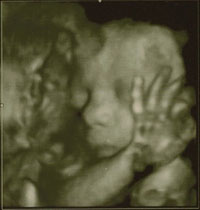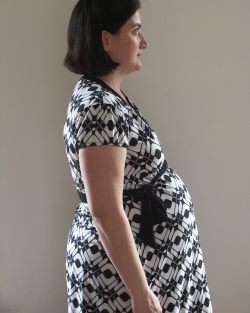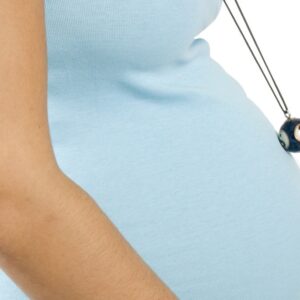When you are 30 weeks pregnant, you are likely to have increased at least 18.7 lb (8.5 kg) in weight of which the baby is actually only some 18-19%. Want to know what the rest is? Read about pregnancy weight gain here.
Your baby’s brain is developing rapidly this week. Mom may be getting more and more uncomfortable as your belly grows.
Heartburn is common this week, as are mood swings.
Week 29 | Week 31
What to Expect When 30 Weeks Pregnant?
In this article:
How many months is 30 Weeks Pregnant?
When 30 weeks pregnant, you are in your third trimester and month 7 of your pregnancy. The end of the seventh month is nearing, and you will meet your baby sooner than it might seem at this point.
Counting pregnancy weeks and months is sometimes confusing. To make it easier for you, we wrote a short guide that will help you understand how to determine what week/month of pregnancy you are in, as well as how many weeks/months pregnant you are.
Your Baby at 30 Weeks
How Big is my Baby at 30 Weeks?
The fetal age of your baby is now 28 weeks. 30 weeks pregnant, your baby now weighs almost 3 pounds (1.4 kg) – that is like the head of cabbage! And the baby’s length is about 15.7 inches (around 39 cm).
Although at 30 weeks the baby is still very preterm, if the birth happens, a survival rate is as high as 98%, with the appropriate medical care. That is very encouraging.
What Does my Baby Look Like at 30 Weeks Pregnant?
 PinYour baby is gaining weight quickly in preparation for life outside.
PinYour baby is gaining weight quickly in preparation for life outside.
Lanugo, which are the fine, downy hairs found on the body, are starting to disappear. This is also the reason why premature babies have more lanugo than full-term ones. Lanugo serves as a furry coat to protect your baby from extreme temperatures.
Since your baby has already accumulated fat under the skin, and the brain can now function to regulate the body temperature, there is no need for these hairs anymore. But a few can still be seen during childbirth.
The hair on your baby’s head is continuing to grow and thicken. The toenails are now beginning to grow.
Your baby’s proportions are now a newborn. Becoming so tall, this is one of the last weeks when your baby still has enough room to somersault in your womb.
Fetal development
By 30 weeks, all of the major body systems are formed and are now in the maturing phase.
The major development during this week is happening for your baby’s brain. Early in the pregnancy, the brain was just a smooth surface. Now it is characterized by grooves and indentations. This wrinkled appearance allows for the growth of the brain tissues. The bone marrow has begun to produce red blood cells.
The amniotic fluid also decreases in volume as the baby gets bigger – she will need more space in the uterus.
Your baby’s eyesight continues to develop, although it’s not that clear yet. Even after birth, the baby can’t see clearly until after two to three months. The vision then continues to improve throughout childhood. 30 weeks pregnant, the baby’s vision is still 20/400 out of the normal vision, which is 20/20.
Mom’s Body When 30 Weeks Pregnant
The Belly
Your belly is growing bigger and bigger, and you probably don’t see your feet anymore.
As previously mentioned, it is getting cramped for your baby inside the womb. As there is less room for the baby to punch and do somersaults, you will feel less hard kicks. However, it is still important that you feel your baby’s movements regularly. If you are worried that your baby is not moving enough or not moving at all, contact your doctor. It is always better to be safe than sorry.
Pregnancy Symptoms
 PinAt 30 weeks, your baby is still positioned high near your rib cage, and you might experience shortness of breath.
PinAt 30 weeks, your baby is still positioned high near your rib cage, and you might experience shortness of breath.
The growing uterus pushes up against the diaphragm, which compresses the lungs and makes it harder for the lungs to fully expand when you breathe in. However, a little later, the baby will drop into your pelvis, and that should make it easier for you to breathe deep again.
With the belly expanding and the weight increasing, stretch marks are a common occurrence in pregnancy. Some women might get them earlier in the pregnancy, but for some, they appear later.
Stretch marks can appear anytime. There is no miracle cure for it. Some women say that certain creams or oils helped. But for some, stretch marks will appear despite trying different products.
Some of the aches and pains you are probably already used to continue. With belly growth and weight gain, back pain isn’t uncommon. It might worsen in the third trimester because of the additional weight gain.
These aches and pains might also make it harder for you to find a comfortable position and sleep. Combined with the growing need for frequent urination, it is no wonder if you are exhausted because you have trouble sleeping.
The best sleeping position to allow better blood flow is on your left side, which aids in proper circulation to your organs and extremities.
You will continue to have impaired circulation because your growing uterus continues to put pressure on your veins and arteries. Lying flat on your back might become impossible over time.
Your baby’s head is now putting pressure on your bladder, causing you to urinate more frequently. Your breast may become tender (again!) as they gear up for the production of milk.
You might notice a yellowish, creamy substance occasionally leaking from your nipples. This substance is called colostrum or pre-milk. It is much thicker than the milk that will be produced later in breastfeeding. It is the first stage of breast milk that will last for a few days after the baby’s birth.
Some women will notice colostrum leaking from their breasts during later stages of pregnancy, although for some, it might happen earlier or doesn’t have to happen at all before giving birth. No matter if you leak colostrum during pregnancy or not, it is considered normal.
You may notice that your heartburn is getting worse each week.
There are ways to prevent heartburn, like avoiding foods that are gastric irritants, such as spicy foods, fatty or fried foods, coffee, carbonated beverages, and chocolate.
Eat small yet frequent meals, and don’t lie down while eating or right after a meal.
Stress has also been associated with heartburn. So, take your time to relax and have frequent rest periods. Talk to your healthcare provider if none of the above mentioned helps.
You might also have constipation problems, which might have started earlier in the pregnancy or have appeared just recently. As your uterus is growing, it puts pressure on your bowels. Drinking plenty of water and eating fiber-rich foods might help.
A common problem that appears in the third trimester for most women, even though it can appear earlier, is carpal tunnel syndrome. It happens because the build-up of fluid around the wrist puts pressure on the median nerve in your wrist, which causes pain, tingling, numbness, or weakness in the hand and fingers. As many as two thirds of all pregnant women may experience som degree of carpal tunnel, according to research.
Hormonal changes will make your ligaments laxer and the joints become looser. This is also in preparation for childbirth.
Another effect of hormonal shifting is your mood swings. These may also be due to the uncomfortable symptoms that you are experiencing throughout the pregnancy.
These are just a normal part of pregnancy. But if you feel that the condition worsens from time to time and you can no longer handle it, then better consult your obstetrician or your psychologist, for you might be developing maternal depression.
If you haven’t already felt it until now, you might start to experience Braxton Hicks contractions. These are uterine contractions that are usually painless and are felt only in the front. They begin and remain irregular, do not increase in frequency, duration, and interval, and usually disappear with rest or when you change the position.
On the other hand, true contractions begin as irregular contractions but become regular and predictable. They might be first felt in the lower back and travel to the abdomen like a wave. They don’t stop even when you rest and sleep and increase in frequency, duration, and interval.
If you think you are experiencing true contractions or are unsure whether what you’re feeling are Braxton Hicks contractions or true contractions, contact your doctor immediately.
Things to do and buy this week
If you haven’t started to attend a prenatal class yet, I strongly recommend you do. I did both a regular hospital-based class, a breathing class and an online class. All were valuable in their different ways.
You may want to start buying baby clothes. However, don’t go crazy. You’ll probably receive a lot as a gift from family and friends. Also, babies grow really fast, and you can always buy additional clothes when you see what you need most.
With your baby’s arrival approaching, you might be getting a bit stressed and anxious. Try some relaxing techniques, such as a massage, yoga, walking, listening to music, or anything that helps you calm your mind and body.
Get immediate expert help with your pregnancy questions through JustAnswer Pregnancy:Week 30 Pregnancy Video
Diary of a Daughter
What’s it really like being 30 weeks pregnant…? Here’s a true diary from a 30 weeks pregnant mom (Me..!)
This week was tough. I had to medicate twice to mitigate the contractions.
The visit to my midwife went well, though, my belly and my baby are growing and my iron levels have increased a bit.
Are you also 30 weeks pregnant? Please share your experiences and thoughts by leaving a comment below!
Read Next
- Premature survival rates week by week
- All about Braxton Hicks contractions
- Childbirth videos that are helpful (even when you’re pregnant)
Week 29 | Week 31
References:
Prevalence of carpal tunnel syndrome in pregnant women
Mayo Clinic, Mayo Clinic Guide to a Healthy Pregnancy
Joanne Stone MD and Keith Eddleman MD, The Pregnancy Bible: Your Complete Guide to Pregnancy and Early Parenthood
Nilsson, L; Hamberger, L. A Child Is Born
Soderberg, L., Mammapraktika. B Wahlstroms.
Image1: Image of 30 weeks fetus by Dean Wissing
Image2: Image of 30 weeks belly by Graham and Sheila

Paula Dennholt founded Easy Baby Life in 2006 and has been a passionate parenting and pregnancy writer since then. Her parenting approach and writing are based on studies in cognitive-behavioral models and therapy for children and her experience as a mother and stepmother. Life as a parent has convinced her of how crucial it is to put relationships before rules. She strongly believes in positive parenting and a science-based approach.
Paula cooperates with a team of pediatricians who assist in reviewing and writing articles.







